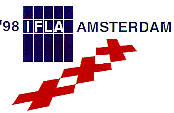
As of 22 April 2009 this website is 'frozen' in time — see the current IFLA websites
This old website and all of its content will stay on as archive – http://archive.ifla.org

As of 22 April 2009 this website is 'frozen' in time — see the current IFLA websites
This old website and all of its content will stay on as archive – http://archive.ifla.org





Library and its services are not indigenous to Africa, they were like the ubiquitous saloon car the tractor or the radio imported as most parts of the continent became colonised. Unlike these other imported items however, the library is the least appreciated and still has to struggle for recognition to the utter chagrin of librarians and interested observers. The question then arises as to why the masses in Africa have failed to respond adequately to the library services in spite of the fact that libraries have intrinsic values beyond demonstration. Some of the reasons for this unpleasant development are to be found partly in the socio-economic milieu of the continent and partly in the nature of the library service imported during colonial rule.
The type of library service that was imported into a continent that was radically oral in nature, was the mirror -image of what was available in the metropole. The question was not frequently asked whether the type of library service that was imported fitted into the socio-economic milieu of the continent. The information needs of Africans were little understood, rather library models from Europe were brought into a continent in which such models were not very attracture. It must be conceded that the librarians who brought library services were, in the main, well-meaning dedicated, often very patient sometimes working very hard in what was often very hostile environment. African governments at indepedence embraced with gusto the development of education, agriculture health services etc. but failed to realise the interconnectedness not only between education and libraries but also between libraries and national development.
The post-independence situation of book provision best illustrates some of these problems. Not only did it become very expensive to import books becuase of their high cost; the production of books lagged behind world levels as the Table below shows, with Africa, producing only 2% of world total.
TABLE 1.
WORLD BOOK TITLE PRODUCTION (1991).
World Total - 863,000
Africa - 13,000
Asia - 215,000
Europe - 403,000
Oceania - 12,000
Former USSR. - 76,000
Rest of the World - 144,000.
Starting from the late 1970's into the early 1980's, there was a gradual shift in the conceptual perspective of library provision in Africa. It was clear that the old "paradigm" to use Thomas Kuhns term or the "image" to borrow from Kenneth Boulding has to change. It came slowly to be understood as Abid3 has aptly argued that an efficient information service should be based on a careful analysis of the needs of the population to be served.
Perhaps typical of this new paradigm is the RUDIS Project carried out at Badeku Village near Ibadan. Professor Aboyade, the director of the project in 1981 visited Badeku village in order to offer informal information service. Whereas information materials were presented when needed, the research team was willing to listen and respond to expressed information needs. The research proved that rural Africa need information albeit not currently provided by the conventional library system.
Sturges and Neill4 have also found programes of similar nature in other countries, an example of which is the Malian Sound Library. Care must however be taken to ensure that this does not become an end in itself. Rosenberg5 had warned against taping memories and preserving them in an information centre as though the indigenous knowledge systems were dead!
Shifts have also occurred in library services to school children as the Abadina project6 illustrates. The research project was established to test the hypothesis that library education skills will positively affect the academic and social attainment of the child. From the study it was clear from Ogunsheye's own view that there was cognitive improvement in the child exposed to library use. Similar programmes are to be found in Dakar, Senegal as has been excellently demonstrated by Madam CorrQa of the school of Library, Archives and Documentation of Dakar. It would appear that more and more young people are reading for pleasure as surveys have shown7. Nurturing a reading habit in the young has far reaching consequences. As Dekutsey8 noted: "the creation and existence of a large cross-section of a reading public is crucial to the success of publishing as well as writing in Africa".
Finally, another area of gradual shift is related to library support for interacy programmes. Kigongo-Bukenya9 did show not only the apathy of librarians to the support of campaigns for the eradication of illiteracy but the enormity of the problem of demonstrating to them the link between their work and literacy programmes. The idea of reviving what are called "reading rooms" which came into existence during the Second World War for the purpose of serving the needs of new literates is proving very attractive. Consolidating on these new developments will enable libraries in Africa to shed their elitist image as well as bring library services to the doorstep of all particularly the silent majority on the continents.